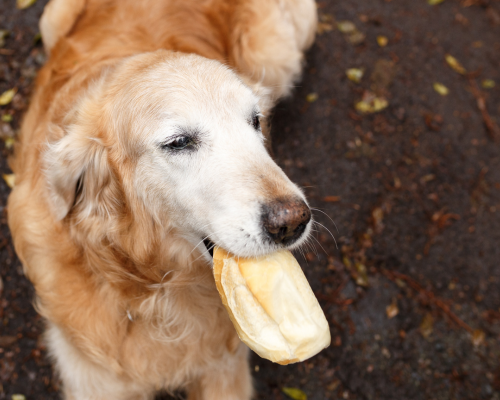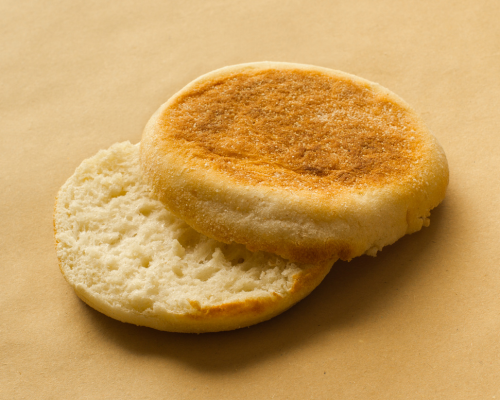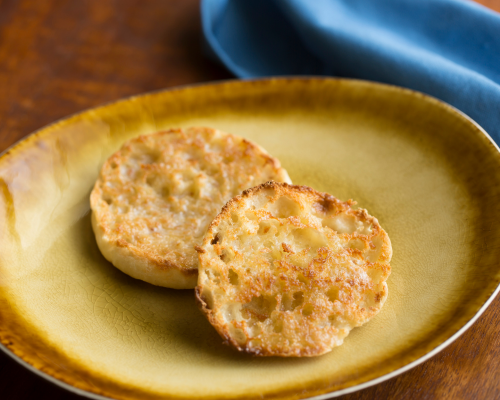Can Dogs Eat English Muffins? What You Need To Know!
Can Dogs Eat English Muffins? What You Need To Know!

Vet Reviewed

By: Sarah Hodgson
December 12, 2023
- Posted in DogsCan Dogs Eat
Table of Contents
Not all human foods are safe for dogs, are English Muffins an exception?? In this article, we will answer that question and explore whether these delicious breakfast treats are safe for your dog.
So, let's dive in!
What Are English Muffins?
Before we dive into whether dogs can eat English muffins, let's first understand what exactly they are.
English muffins are a type of breakfast bread that originated in the United Kingdom. They are round, and flat, and have a distinctive texture that is achieved by cooking the dough on a griddle. English muffins are often enjoyed toasted, with butter, jam, or as a base for breakfast sandwiches.
To put it simply they are a breaded breakfast snack.

What Are The Ingredients In English Muffins?
To understand if dogs can eat English muffins, it is important to know the ingredients that go into making them before we can decide whether they are safe.
- Flour: Dogs can consume plain flour in moderation, but it doesn't provide significant nutritional value for them.
- Water: Safe for dogs.
- Yeast: Small amounts of cooked bread with yeast are generally safe for dogs, but raw yeast dough can be harmful.
- Milk: While some dogs are lactose intolerant and may have trouble digesting milk products, the amount of milk in an English muffin is usually small.
- Sugar: Small amounts of sugar are not toxic to dogs, but it's best to avoid feeding them overly sweet or sugary foods.
- Salt: Dogs require only a small amount of salt in their diet. Excessive salt intake can lead to health issues, so it's important to monitor their overall sodium intake.
- Butter or Oil: Small amounts of these fats are usually safe for dogs, but moderation is key, as too much fat can lead to digestive upset.
Can Dogs Eat English Muffins?
Now to what you came here for, is it safe for dogs?
It is best to avoid feeding English muffins to dogs. While they may not be toxic, they do not offer any significant nutritional benefits to your dog.
English muffins are primarily made of refined flour, which lacks the essential nutrients that dogs need for optimal health. Feeding your dog foods that are not nutritionally balanced can lead to deficiencies and long-term health issues. To put it simply there are no benefits so why feed it?
Additionally, English muffins often contain added sugars and salt, which are not suitable for dogs in large quantities. Excessive sugar intake can lead to weight gain, dental problems, and even diabetes in dogs. High sodium levels in English muffins can also cause dehydration and put a strain on your dog's kidneys.
Will A Small Portion Of English Muffins Harm My Dog?
While a small portion of English muffins is unlikely to cause immediate harm to your dog, it is still best to avoid feeding them this food altogether.
Dogs have different dietary needs than humans, and indulging them in foods that do not contribute to their overall health can lead to long-term consequences. Not all human foods are suitable for dogs.
Are There Risks To Feeding English Muffins To Dogs?
Feeding English muffins to dogs can pose certain risks, especially if they contain additional ingredients such as cinnamon or raisins.
Here are some risks:
- High Carbohydrate Content: English muffins are high in carbohydrates, which are not a primary nutritional requirement for dogs. Feeding dogs a diet excessively high in carbohydrates can contribute to obesity and other health issues.
- Salt Content: English muffins often contain salt. While dogs need a small amount of salt for proper bodily function, excessive salt intake can lead to sodium ion poisoning, causing symptoms like vomiting, diarrhea, and increased thirst. Commercially produced English muffins may have higher salt content than homemade versions.
- Yeast Dough: If the English muffins contain raw yeast dough, it can be harmful to dogs. The yeast can continue to ferment in their stomachs, producing alcohol and carbon dioxide, leading to bloating and other digestive issues.
- Lactose Intolerance: Some dogs are lactose intolerant, and the milk in English muffins may cause digestive upset in these individuals.
- Additives and Flavorings: Some English muffins may contain additives, flavorings, or other ingredients that can be harmful to dogs. For example, certain seasonings like garlic and onion are toxic to dogs.
In addition, if there is Cinnamon, in large amounts it can be toxic to dogs and cause digestive upset. Raisins, on the other hand, are highly toxic to dogs and can lead to kidney failure. Even a small amount of raisins can have serious consequences for your furry friend. Therefore, it is crucial to check the ingredient list carefully before offering any human food to your dog.

Ingredients to Avoid In English Muffins For Dogs
Apart from the basic ingredients found in English muffins, there are a few additional ones that can be harmful to dogs so avoid them altogether. Some English muffins may contain artificial sweeteners, such as xylitol, which is highly toxic to dogs. Xylitol can cause a sudden drop in blood sugar levels and lead to liver failure in dogs. It is important to be vigilant and avoid any English muffins that contain artificial sweeteners or any other potentially harmful ingredients.
In addition, as mentioned earlier raisins and cinnamon should both be avoided as well.
The Bottom Line
So there you have it, it is best to be on the side of caution and avoid feeding English muffins to your dog. While they are not toxic, they lack the necessary nutrients for a balanced dog diet and can contain ingredients that are harmful to dogs.
If you have any concerns about your dog's diet or suspect they have consumed something harmful, always consult your veterinarian for guidance. Your dog's health and well-being should always be the top priority.

Subscribe to Petfluence!
Get updates on the latest posts and more from Petfluence straight to your inbox.